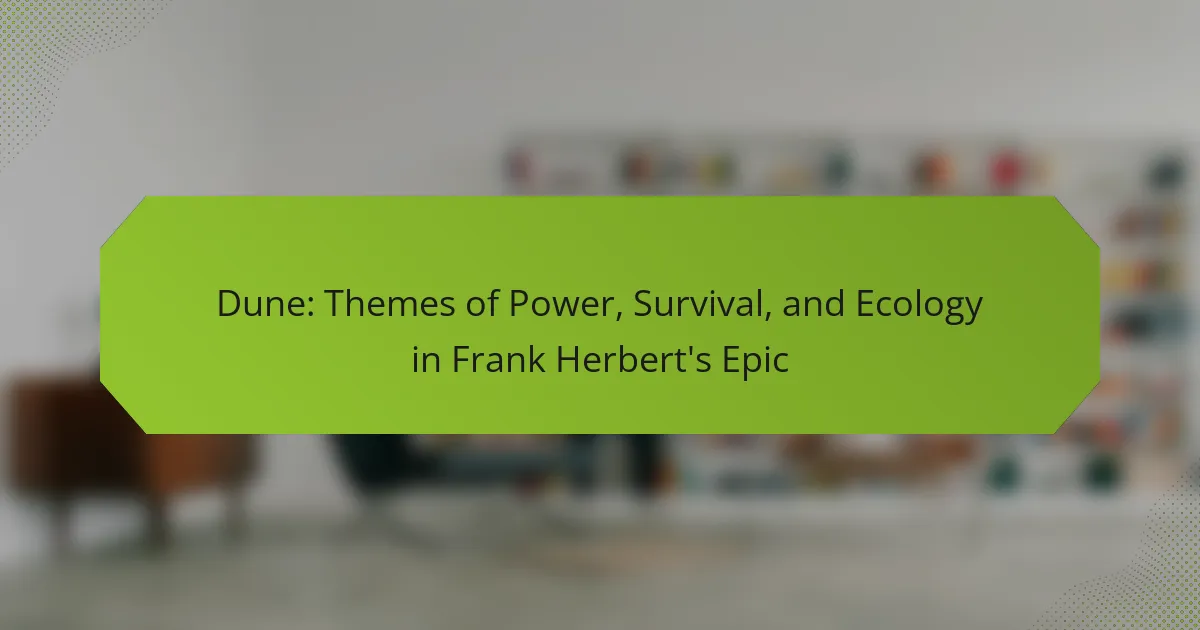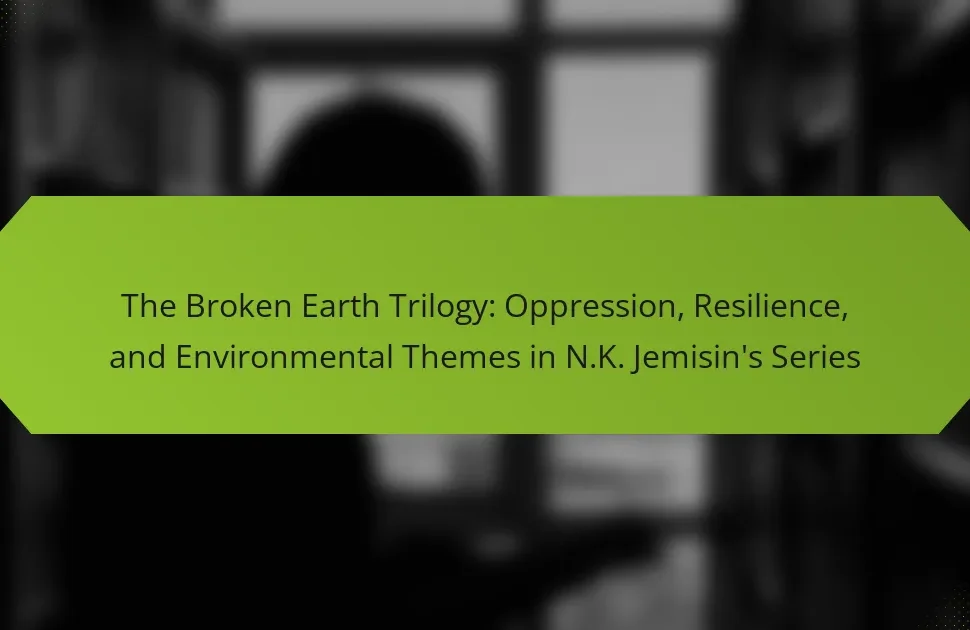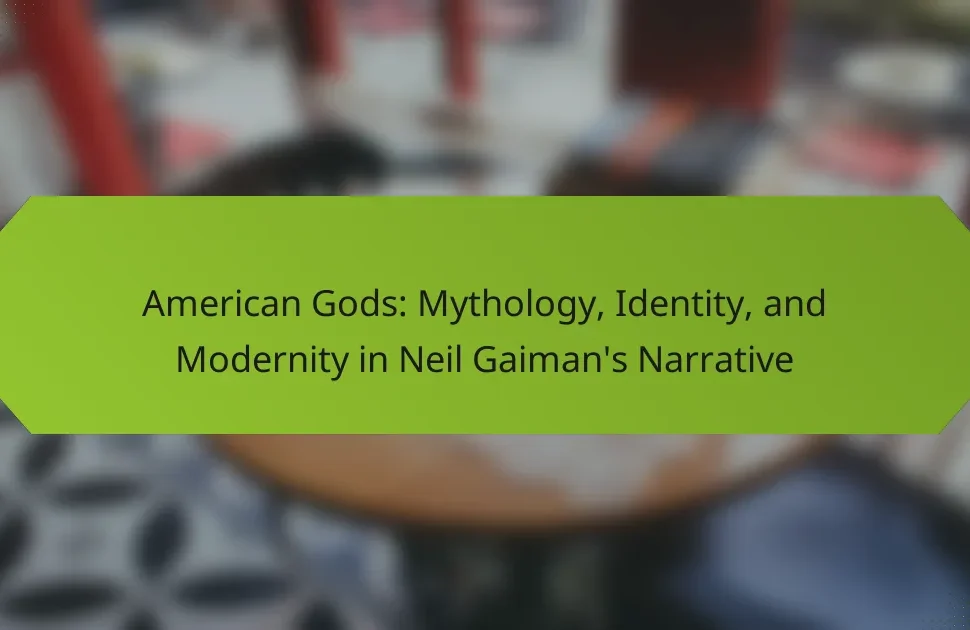Frank Herbert’s Dune delves into critical themes of power, survival, and ecology. The novel examines the dynamics of control and manipulation in political landscapes. It highlights the harsh realities of survival in the desert environment of Arrakis. Additionally, Dune addresses ecological concerns, emphasizing the balance between resource management and sustainability.

What are the central themes of power in Dune?
The central themes of power in Dune revolve around control, manipulation, and the struggle for dominance. Power manifests through political intrigue, ecological stewardship, and the influence of religion. Herbert illustrates how power dynamics shape societies and individual destinies, particularly through the character of Paul Atreides. His journey reflects the complexities of leadership and the burdens of prophetic destiny. The interplay between power and survival highlights the necessity of adaptability in a harsh environment, emphasizing the intrinsic connection between ecology and authority.
How is power portrayed through the characters of Dune?
Power in Dune is portrayed through manipulation, control, and the struggle for survival. Characters like Paul Atreides exemplify the complexities of power as he navigates political intrigue and prophetic destiny. Lady Jessica’s influence showcases maternal power and loyalty, while Baron Harkonnen embodies ruthless ambition. The interplay of ecology and power is evident in the control over spice, a resource central to the universe’s economy and politics. Herbert illustrates that power is not merely about dominance but also about responsibility and the consequences of one’s actions.
What role does political intrigue play in the story?
Political intrigue is central to the narrative of Dune, driving character motivations and plot development. The power struggles among noble houses highlight themes of betrayal, loyalty, and ambition. For example, House Atreides faces manipulation from House Harkonnen, illustrating how political machinations impact survival. This intricate web of alliances and enmities shapes the ecological and social dynamics of the desert planet, Arrakis. The unique attribute of Herbert’s storytelling lies in its ability to intertwine political conflict with environmental themes, emphasizing the consequences of power on both individuals and ecosystems.
How does the concept of leadership evolve throughout the narrative?
The concept of leadership in “Dune” evolves from traditional authority to a more complex, multifaceted understanding. Initially, leadership is represented through noble houses and their power dynamics. As the narrative unfolds, Paul Atreides transforms from a reluctant heir to a visionary leader, embodying the intersection of destiny and choice. His journey highlights the unique attribute of prophetic insight, which shapes his leadership style. The evolution emphasizes adaptability and the responsibility of leaders to their followers, reflecting the rare attribute of ecological awareness in leadership. Ultimately, leadership in “Dune” becomes a blend of personal growth and societal obligation, illustrating how power must be wielded with an understanding of its broader implications.

How does Dune explore the theme of survival?
Dune explores the theme of survival through its portrayal of harsh environments and the struggle for resources. The desert planet Arrakis exemplifies extreme conditions that force characters to adapt or perish. Survival is not merely physical; it encompasses political maneuvering and ecological understanding. The characters’ ability to navigate these complexities highlights the interconnectedness of life and the necessity of resilience in the face of adversity.
What survival strategies do characters employ in the harsh desert environment?
Characters in “Dune” employ various survival strategies to adapt to the harsh desert environment. They utilize water conservation techniques, such as wearing stillsuits that reclaim moisture. Resourcefulness is key; they cultivate relationships with the Fremen, who possess deep ecological knowledge. Additionally, they navigate the desert’s dangers by understanding sandworm behavior and utilizing spice for enhanced abilities. These strategies reflect the themes of power, survival, and ecology central to Herbert’s narrative.
How does the struggle for resources shape the story?
The struggle for resources is central to the narrative of Dune, driving conflict and character motivations. In the harsh desert environment of Arrakis, water scarcity shapes survival strategies, while the valuable spice melange becomes a focal point of power struggles. This dynamic illustrates how ecological factors influence political systems and societal structures. The pursuit of scarce resources leads to alliances and betrayals, emphasizing the theme of survival against environmental challenges. Ultimately, the fight for resources underscores the interconnectedness of ecology, power, and human ambition in Herbert’s epic.
What psychological aspects of survival are depicted in Dune?
Dune explores psychological aspects of survival through themes of fear, adaptation, and resilience. Characters confront their deepest fears, shaping their responses to extreme environments. Paul Atreides embodies the struggle for identity and purpose amidst chaos, highlighting the psychological toll of leadership. The harsh desert landscape serves as a catalyst for transformation, forcing characters to adapt or perish. This interplay between environment and psyche emphasizes the complexities of survival in a hostile world.

In what ways does Dune address ecological concerns?
Dune addresses ecological concerns by highlighting the fragility of ecosystems and the consequences of exploitation. The desert planet Arrakis serves as a backdrop for exploring themes of resource management and sustainability. Herbert illustrates the impact of human actions on the environment, emphasizing the need for balance. The novel’s focus on the spice melange reveals the complex interplay between ecology and economy, showcasing the dangers of overconsumption and environmental degradation.
How is the desert planet of Arrakis significant to the ecological themes?
Arrakis is significant to ecological themes as it represents the intricate relationship between environment and survival. The planet’s harsh desert conditions shape its inhabitants’ culture and politics. Water scarcity drives conflict and cooperation, illustrating the importance of resource management. The spice melange, a unique substance, further emphasizes ecology’s role in power dynamics. Arrakis serves as a microcosm of ecological interdependence, highlighting how environmental factors dictate societal structures.
What messages about environmental stewardship are conveyed?
“Dune” conveys messages about environmental stewardship through its depiction of ecological balance and the consequences of exploitation. The narrative emphasizes the interconnectedness of life on Arrakis and the necessity of sustainable practices. Characters like Paul Atreides illustrate the importance of respecting natural resources, while the struggle for control over water symbolizes broader themes of environmental conservation. The novel warns against the dangers of unchecked ambition and highlights the need for harmony with nature.
How does the relationship between humans and nature unfold in the narrative?
The relationship between humans and nature in “Dune” is complex and deeply intertwined. Frank Herbert illustrates how ecological systems influence human survival and power dynamics. The desert planet of Arrakis serves as a backdrop, showcasing the necessity of adapting to harsh environments.
Humans exploit natural resources, particularly the spice melange, which symbolizes both power and dependency. This dependency highlights the theme of sustainability versus exploitation. The Fremen, indigenous to Arrakis, embody a unique attribute of harmony with their environment, demonstrating that survival is rooted in ecological balance.
Herbert’s narrative emphasizes the rare trait of interconnectedness, where human actions impact the broader ecosystem. This theme resonates with contemporary environmental issues, reinforcing the importance of respecting nature to ensure survival.

Which unique attributes of Dune contribute to its themes?
The unique attributes of Dune that contribute to its themes include its intricate world-building, complex characters, and the interplay of politics and ecology. These elements shape the narrative’s exploration of power dynamics, survival instincts, and environmental sustainability. The desert planet Arrakis serves as a rare attribute, symbolizing both the harshness of survival and the preciousness of resources. Herbert’s nuanced portrayal of the Fremen culture highlights unique survival strategies, emphasizing community resilience in the face of adversity. Additionally, the concept of “melange” as a valuable substance ties directly to themes of power and control, showcasing how resources dictate societal structures.
How do the spice and its properties symbolize power and survival?
The spice in “Dune” symbolizes power and survival through its unique attributes and essential role in the ecosystem. Spice grants heightened mental abilities and extended life, making it a coveted resource. Control of spice production translates to political dominance, as factions vie for its influence. Additionally, its scarcity highlights survival challenges, emphasizing ecological balance and the consequences of exploitation. The spice embodies the intersection of human ambition and the natural world, reinforcing themes of power dynamics and the necessity of coexistence.
What differentiates the Fremen culture in their approach to ecology?
The Fremen culture uniquely prioritizes ecological balance and sustainability in their harsh desert environment. They view water as sacred and practice meticulous conservation techniques, such as reclaiming moisture from their bodies. Their deep understanding of the desert ecosystem informs their practices, leading to a symbiotic relationship with their environment. This contrasts sharply with external exploitative approaches, emphasizing survival through respect for natural resources.

What are the rare attributes that enhance the thematic depth of Dune?
Dune’s thematic depth is enhanced by rare attributes such as the intricate interplay of prescience and free will, the concept of ecological imperialism, and the profound exploration of identity through the lens of the Kwisatz Haderach. These elements create a complex narrative that challenges traditional notions of power and survival.
How do prophetic visions influence characters’ decisions?
Prophetic visions significantly influence characters’ decisions in “Dune” by shaping their understanding of power and survival. Characters like Paul Atreides are guided by visions that reveal potential futures, impacting their choices in critical situations. These visions often serve as a means to navigate the complex interplay of political intrigue and ecological challenges on Arrakis. The foresight gained from these visions allows characters to anticipate threats and opportunities, ultimately driving their actions toward achieving their goals. As a result, prophetic insights become a tool for strategic decision-making, reinforcing the theme of survival amidst the harsh realities of their environment.
What role does technology play in the balance of power and ecology?
Technology plays a crucial role in shaping the balance of power and ecology in “Dune.” It influences resource management, environmental adaptation, and social structures. The advanced technologies in the universe, such as terraforming and spice production, demonstrate how control over technology translates to power. For example, the ability to manipulate ecosystems directly impacts survival strategies for various factions. Additionally, technology facilitates the exploitation of natural resources, highlighting the tension between ecological preservation and power dynamics. This interplay underscores the theme of survival, as characters navigate the consequences of their technological advancements in a fragile environment.

How can readers apply the themes of Dune to contemporary issues?
Readers can apply the themes of Dune to contemporary issues by examining power dynamics, survival strategies, and ecological concerns. The struggle for control over resources in Dune mirrors today’s geopolitical tensions over oil and water. The characters’ adaptability in harsh environments reflects the resilience needed in climate change discussions. Additionally, the ecological principles in Dune emphasize sustainable practices, urging readers to consider the long-term impacts of their actions on the planet. These themes encourage critical thinking about our societal structures and environmental responsibilities.
What lessons about power dynamics can modern societies learn from Dune?
Modern societies can learn about the complexities of power dynamics from Dune’s portrayal of political intrigue and resource control. The struggle for the spice melange illustrates how vital resources shape alliances and conflicts. Herbert emphasizes that power often resides with those who control essential resources, reflecting real-world dynamics. Additionally, the manipulation of religion and culture in Dune shows how ideologies can be tools for maintaining power. This highlights the importance of understanding the interplay between power, survival, and ecological balance in contemporary governance.
How can the survival tactics in Dune inspire real-world resilience?
Survival tactics in Dune can inspire real-world resilience through adaptability, resourcefulness, and communal support. Characters like Paul Atreides exemplify strategic thinking in adverse conditions. The harsh desert environment teaches the importance of conserving resources and understanding ecological balance. These themes encourage individuals to cultivate resilience by embracing change and fostering collaboration within communities.
What ecological practices from Dune can be relevant today?
Ecological practices from Dune emphasize sustainability and resource management, relevant for today’s environmental challenges.
1. Water conservation techniques mirror modern methods like rainwater harvesting and greywater reuse.
2. The concept of ecological balance showcases the importance of biodiversity and ecosystem health in urban planning.
3. Community involvement in environmental stewardship reflects current trends in grassroots activism and local conservation efforts.
4. The use of indigenous knowledge for sustainable practices highlights the value of traditional ecological wisdom in contemporary environmental science.
What common misconceptions should readers avoid when interpreting Dune’s themes?
Readers should avoid oversimplifying Dune’s themes, particularly regarding power, survival, and ecology. A common misconception is viewing power solely as a corrupting force; instead, it’s a complex interplay of responsibility and consequence. Another misconception is interpreting survival as merely physical endurance; it encompasses moral and ethical dilemmas faced by characters. Additionally, ecology is often seen only as environmentalism, but Herbert presents it as a broader system of interdependence, influencing social structures and human behavior. Understanding these nuances enhances the interpretation of Dune’s themes.




